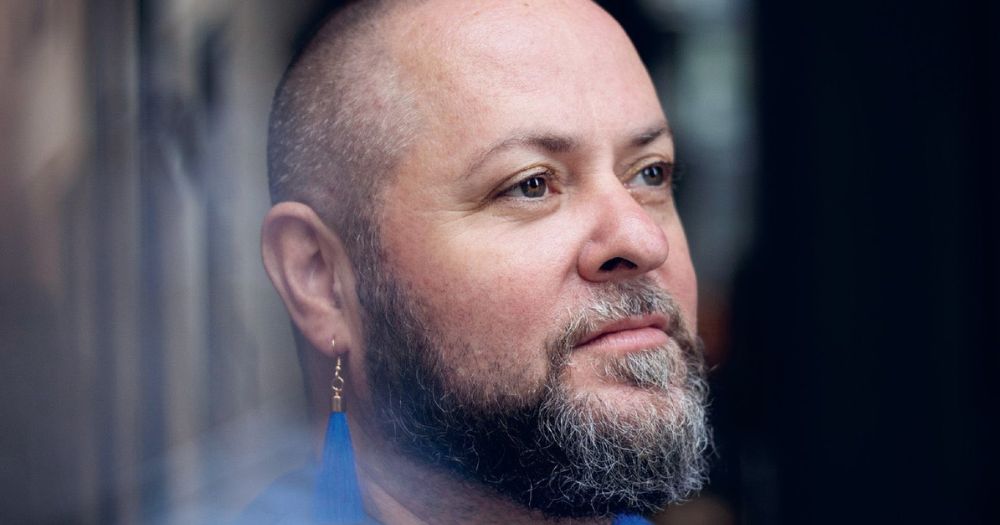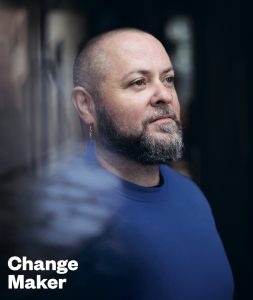Michael Barron has had a hugely positive impact on the lives of the LGBTQ+ community and the disenfranchised over the years. He caught up with GCN to discuss his journey and the essential work he does with The Rowan Trust.
During our interview, I found Michael Barron to be a lovely, humble man who spent much of our conversation giving credit to the work done by the unspoken majority and citing the need for cooperation to pioneer social change. His list of achievements is as heartwarming as it is impressive.
Would you like to start off by giving me a short introduction – a little bit about yourself, your background and your introduction to social justice and LGBTQ+ rights?
I got involved in social justice work 25 years ago this year, in 1997. At the time, I had just finished college and was living in the north inner city in Dublin and there was a general election and so there was a huge number of racist graffiti around the neighbourhood. My response was to contact the Irish Refugee Council. They asked me to start teaching English classes to young migrants who arrived mostly from Romania and Angola, and I loved it. I really loved working with young kids and their families. It involved visits to different families’ homes and learning about different cultures. I found the work really interesting and rewarding.
I then went back to college and studied community work. When I was finished doing that, I started work in Focus Ireland. At that time I was working with homeless teenagers, and what we found was a disproportionate number of the young people coming into Focus were LGBTQ+.
There was no organisation for LGBTQ+ young people who were marginalised – there were no professional services. That planted a seed, and I got involved in a number of LGBTQ+ community work areas. I started working with the Gay Men’s Health project and through that work we ended up setting up what would become Belong To.
What was significant about those five years before Belong To was that I was working with other minorities and marginalised communities – those who were homeless, using drugs heavily, were migrants or Travellers. My entry into the world of social justice was, in a way, not an LGBTQ+ entry point. It came through working with a number of other injustices going on, in terms of racism and classism in particular. I was coming into what would become Belong To with a very strong class and race analysis and I think that had a significant shaping on what Belong To would go on to do.
You have an incredible catalogue of social work under your belt. For me growing up as a queer person in Ireland over the last ten years, Belong To has been so important. Could you explain more about the work and goals of Belong To and how it has shaped Ireland for young queer people?
I think one of the important things to note about Belong To is it was never set up to be a youth group. I think the framework in which people understood Belong To was through these groups, but they were always a piece of a bigger social change agenda. It was set up with a very radical social justice, class analysis agenda to support marginalised LGBTQ+ young people. This radical agenda propelled us into spaces that LGBTQ+ groups were not supposed to be involved with – education or the asylum process. But because we were coming with these other analyses and having worked with these other marginalised young people, we naturally took those issues on.
I remember very early on in my Master’s degree I was interested in body issues. At the time, so many young people had such terrible body image and it related directly to self-harm and other serious mental health issues. Once I started digging into what was going on for young people, the issue of school just kept emerging repeatedly. This was in 2003 and school was a dire place for queer children to be.
Although we never set out to start working in schools, it became obvious that this is where a huge part of the problem was. I think that the work we did in the schools was quiet, background work alongside the Department of Education. We worked quite a bit with various bishops to shift their concerns about LGBTQ+ people being a danger to children to seeing homophobia was the danger. It took a long time, there were often many closed doors that we were kept behind. There was a long process of being relentless before anything opened or came back. It was disheartening in the earlier days, and there was a sense from others of “why bother?” But we could not let this school system where young people were essentially being tortured day by day continue.
Were your goals with EQUATE heavily inspired or connected to your work with Belong To?
They were connected. A lot of the work with Belong To was trying to find Irish workarounds for problems that were immovable. The Catholic Church, at the time, maintained 94% of primary schools and 50% of schools at secondary level, which meant we always had to work within that system, down to trying to convince Catholics that it was okay to be LGBTQ+ friendly even though what they taught could never be that; there was a lot of dissonance there.
After about 12 or 13 years of doing that, there were certain things that could not be overcome by Belong To – it just was not the right body to fight that battle. Nobody would listen to an LGBTQ+ organisation trying to get the Catholic Church out of schools. EQUATE was born out of that, but also from other ethnic minority communities that were not Catholic who were receiving unfair treatment within the school system. EQUATE was inspired by the experiences of marginalised young people. We decided to tackle these issues head-on.
EQUATE only lasted a few years. Our main goal was to have the Baptism Barrier removed, which occurred when schools with Catholic patronage gave preference to Catholic kids over non-Catholic kids. We worked with the Department of Education very closely to have that removed. Now Catholic schools cannot use religion as an admissions criterion. The Baptism Barrier was removed in 2018 as part of the school Admissions Bill, being the biggest education policy change in the history of the state.
Can you expand on your role as the executive director of the Rowan Trust?
After leaving EQUATE in 2018, I spent numerous years doing a PhD and consultancy work. During that time, we were always trying to find funding sources for the work of LGBTQ+ and social justice work. The current government will only fund work that is not overly critical of it, but we want to fund work that is critical of the current government – or nothing will ever change. I began going to the States to attract international funders to Ireland, and that worked to some degree, but then we also tried to set up an LGBTQ+ fund with individual owners. that became the Equality Fund in 2018, and out of that we created the Rowan Trust.
At the Rowan Trust, we bring activism and funding together. Everyone who works in the Rowan Trust is an activist, meaning we are having close connections to the communities we work with. Because we are independent of state and other governing bodies, we are able to address stronger issues that would be tough for other funding organisations to take on, such as sex work, hate crime and hate speech, freedom of assembly and the disruption of the rising far-right. We are at a crunching point in Irish politics where we have yet to see any major electoral success from a far-right party but undoubtedly, unless something is done, that will happen.
How do you think the work you have done has shaped Ireland for social change?
Currently, I am writing a book about the LGBTQ+ youth movement from the decriminalisation act in 1993. A lot of how we look at history is through the big-ticket items – decriminalisation, marriage equality, gender recognition – but I am interested in what happens in between and in the face of opposition. Sometimes we just want to hear those hero stories. When you get into those spaces where the real change happens, it is the quieter places in between big events. There are always loads of people involved, and I think I would not agree with, for instance, how the marriage equality story is told. We need people to step forward and be figureheads, and that fulfills an important role, but when we look back on history, I think it is more accurate to remember the thousands of people that were involved in making those shifts happen. I think the young people that came through Belong To changed the country more than anything else did, with Belong To providing them with this framework.
What is your book going to be about?
It is largely about the Belong To movement and other organisations of the time. I had the opportunity to interview politicians, ministers and civil servants who are involved in various departments and LGBTQ+ journalists to ask how things change. I parked the marriage equality referendum and examined the build-up to it.
One of the exciting things to come out of that was radical sensibility and the urgency for change. LGBTQ+ activists were really good during this period we can call ‘radical imagination’, which is imagining the ideal way the world should be growing up as a queer kid and going back to where we are now and how we can build to that.
For example, before Belong To became involved in the marriage referendum it was about ‘love is love’ between adults and the opposition’s piece was “what about the children?’’ We came in and said “we are going to talk about the children. Homophobia is the detrimental factor for the children.”
That is one of the main things I write about. I call it queer optimism, but others call it queer imagination. It means that out of difficulties and hardship we have grown resilient and created wonderful art. It is celebratory, it is born from hardship and is not a naive joy, it understands that what comes from our queer optimism in Ireland is not born from naivety but a need to celebrate ourselves.
This interview with Michael Barron originally appeared in GCN’s October 2022 issue 374. Read the full issue here.
© 2022 GCN (Gay Community News). All rights reserved.
This article was published in the print edition Issue No. 374 (October 21, 2022). Click here to read it now.
Support GCN
GCN is a free, vital resource for Ireland’s LGBTQ+ community since 1988.
GCN is a trading name of National LGBT Federation CLG, a registered charity - Charity Number: 20034580.
GCN relies on the generous support of the community and allies to sustain the crucial work that we do. Producing GCN is costly, and, in an industry which has been hugely impacted by rising costs, we need your support to help sustain and grow this vital resource.
Supporting GCN for as little as €1.99 per month will help us continue our work as Ireland’s free, independent LGBTQ+ media.

